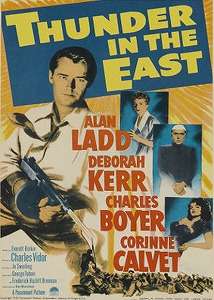Thunder in the East (1952 film)
| Thunder in the East | |
|---|---|
 Theatrical poster | |
| Directed by | Charles Vidor |
| Produced by | Everett Riskin |
| Written by |
Frederick Hazlitt Brennan Lewis Meltzer Jo Swerling George Tabori |
| Based on | novel The Rage of the Vulture by Alan Moorehead |
| Starring |
Alan Ladd Deborah Kerr |
| Music by | Hugo Friedhofer |
| Cinematography | Lee Garmes |
| Edited by | Everett Douglas |
Production company | |
| Distributed by | Paramount Pictures |
Release dates |
5 December 1952 (West Germany) 3 February 1953 (New York City) |
Running time | 97 minutes |
| Country | United States |
| Box office | $2 million (US)[1] |
Thunder in the East is a 1952 war drama film released by Paramount Pictures, and directed by Charles Vidor, based on novel Rage of the Vulture by Alan Moorehead.
Synopsis
The film is set in 1947 after India has gained its independence from Britain. Steve Gibbs (Alan Ladd), an American arms dealer, flies into a small Indian state intending to sell weapons to a local maharajah whose capital is facing an attack from a bandit army. He is opposed by the maharajah's prime minister (Charles Boyer), who is a proponent of Gandhi's philosophy of non-violence. He also falls in love with a blind woman (Deborah Kerr).
Cast
- Alan Ladd as Steve Gibbs
- Deborah Kerr as Joan Willoughby
- Charles Boyer as Prime Minister Singh
- Corinne Calvet as Lizette Damon
- Cecil Kellaway as Dr. Willoughby
- Marc Cavell as Moti Lal
- John Abbott as Nitra Puta
- Philip Bourneuf as Newah Khan
- John Williams as General Sir Henry Harrison
- Charles Lung as Maharajah
- Leonard Carey as Dr. Paling
- Nelson Welch as Norton
- Queenie Leonard as Miss Huggins
- George J. Lewis as Bartender
- Aram Katcher as Servant
- John Davidson as Hotel Clerk
- Trevor Ward as Mr. Darcy Thompson
- Bruce Payne as Harpoole
Production
The film was based on Alan Moorehead's debut novel The Rage of the Vulture, published in 1948.[2] Moorehead got the idea for the novel after travelling through India in 1947.[3][4]
The film rights were bought by Charles Vidor who sold them on to Paramount with himself attached as director. Alan Ladd was assigned to star with Robert Fellows to produce.[5] Filming was postponed, however so Ladd could make Red Mountain.[6] This meant Fellows dropped out and Everett Riskin became producer.[7] "We have a tremendously large cast, fine settings as well as a splendid story", said Riskin.[8]
Luther David was borrowed from MGM to write the script; then it was rewritten by Jo Swerling. Riskin was anxious to avoid offence to the British and Indians, and the novel was significantly altered.[9]
James Mason and Alida Valli were discussed as possible co stars for Ladd.[10] Paramount ended up borrowing Deborah Kerr from MGM to play the female lead and borrowing Corinne Calvet from Hal Wallis to support. Charles Boyer signed for the role of a Nehru-like politician; he had played a Japanese in a 1934 French film called Thunder in the East.[11]
Shooting started 26 March 1951.
Release
The release of the movie was delayed until 1953, in part because Alan Ladd had decided to leave Paramount and the studio wanted to spread out release of his final films for them.[12]
References
- ↑ 'The Top Box Office Hits of 1953', Variety, January 13, 1954
- ↑ "NEW NOVELS" Fausset, Hugh I A. The Manchester Guardian 8 Oct 1948: 3
- ↑ "Books -- Authors" New York Times 19 Oct 1948: 25
- ↑ "NEW FICTION.". The Sydney Morning Herald. National Library of Australia. 21 May 1949. p. 8. Retrieved 8 March 2015.
- ↑ "WALD AND KRASNA PLAN EIGHT MOVIES: New R.K.O. Producing Team Developing Own Film Stories Under Deal at Studio Of Local Origin" by THOMAS F. BRADY New York Times 16 Aug 1950: 25
- ↑ "Trevor Howard Signed for Allen Film; Ladd Again Hero of Outdoors" Schallert, Edwin. Los Angeles Times 27 Sep 1950: 19
- ↑ "JACKSON WINS SUIT AGAINST UNIVERSAL: California High Court Affirms Award of $17,000 in Case Involving Use of a Title Of Local Origin" by THOMAS F. BRADY New York Times 03 Oct 1950: 34
- ↑ "Ladd, Producers Find New Horizons" Los Angeles Times 6 May 1951: E3
- ↑ "HOLLYWOOD REACTS: Employment of Dmytryk Calls Attention To Others Involved in Red Hearings Back to Work Red Slant Touchy Tokyo Interests" by THOMAS F. BRADY. New York Times 20 May 1951: X5
- ↑ "FOX PLANS MOVIE OF 'GUN AND CROSS': Story Concerns Priest and a Western Badman in 1840's --Taylor to Produce" by THOMAS F. BRADY New York Times 02 Feb 1951: 32
- ↑ "Drama: 'Walk East on Beacon' Next George Murphy; Randy Stuart Returns" Scheuer, Philip K. Los Angeles Times 01 Sep 1951: 7
- ↑ "PARAMOUNT SIGNS LADD TO NEW PACT: Studio and Actor Arrange for Deal Whereby He Will Make One Film a Year on Lot" by THOMAS M. PRYOR New York Times 29 Feb 1952: 19
External links
- Thunder in the East at the Internet Movie Database
- Thunder in the East at AllMovie
- Thunder in the East at the TCM Movie Database
- Thunder in the East at the British Film Institute's Film and TV Database